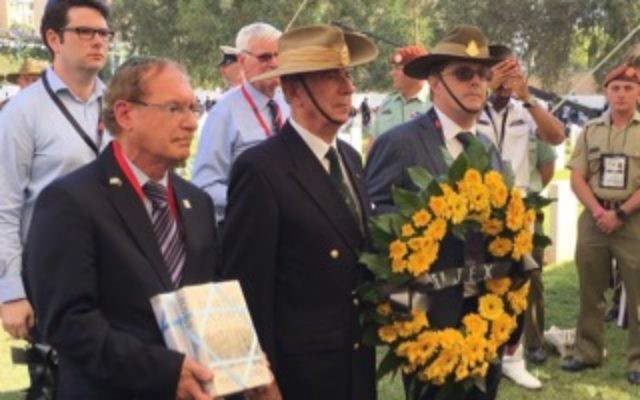Where was the rest of the Jewish world?
IT was a great day for Australians and New Zealanders – but the rest of the Jewish world didn't get the memo.

IT was a great day for Australians and New Zealanders – but the rest of the Jewish world didn’t get the memo.
As hush fell over the cemetery towards the end of Tuesday’s service for the minute’s silence, I reflected on the amazing way that Australians, Jewish and non-Jewish, have embraced their history. Such a large crowd, people who had between them clocked up millions of miles travelled to be there, standing among the graves of men from a different era, honouring a century-old triumph.
But as well as pride at this scene, I also felt a nagging frustration that too many others have overlooked the occasion.
Where were the Brits? It was a huge breakthrough for the British, an Allenby triumph, and as such a key First World War turning point. You would expect the British to show excitement about the centenary. There were British representatives, but hardly any of them representatives of the British establishment actually visiting from London, and the anniversary hardly generated any buzz in the UK.
In the Jewish world, the occasion should resonate with everyone, given its importance in paving the way for the Jewish State, but it didn’t. Few had heard about the anniversary.
As wreath-layer after wreath-layer from organisations connected to Australian Jewry filed past me to lay their tributes, I wondered why there was not a parade of other Jewish bodies from the Diaspora. The executive of the Jewish Agency, an international body, was actually convened in Israel at the time of the service – but was nowhere near Beersheba, holding a meeting in Jerusalem instead.
As for Israel, the email that we journalists received from the Government Press Office the night before the commemorations said it all. “Due to low responsiveness, the GPO’s transportation to Beersheba tomorrow is cancelled.” Israeli journalists were offered transport to the Anzac events but weren’t interested. Gal Gadot is news, fights in Knesset are news, but this historic anniversary seemingly isn’t.
Israelis are good at “strengthening” Diaspora Jewry in moments of grief, like the tragic terror attacks we saw in recent years, but need to share moments of Diaspora joy too.
In Beersheba, people were more engaged in the anniversary. Local authorities taught children in school about the anniversary, got them involved in the civic parade, and encouraged locals to attend events.
“It feels like the Australian story is the story how this modern city, my home, came to be, so it feels like my story,” said Shoshana Gedi, a local mother-of-three, at the parade. But other locals gave blank looks despite the Australian flags and special banners flying around the city, and some of those who did attend events said that their friends were bemused when they said where they were going.
Sammy Katz, a man in his twenties who just moved to Beersheba from America and lives in student dorms, said that his roommates had no idea about the local history. “I don’t think people realise that if the British didn’t win here in 1917 there’s a potential that history would be different. They don’t realise the significance.”
Of course, there are reasons why the Beersheba achievement is held in such special esteem by Australians. It was a major achievement of a newly-independent nation. But while others will not feel the same connection to the events, the Jewish world, which will soon celebrate Israel’s 70th birthday, should have embraced this anniversary as an important episode in the road to statehood.
This was the tour-de-force of Australian Israelophiles, and it’s absolutely right that it was treated as an occasion to celebrate, perfectly rounded-off by a huge kosher and Aussie-style bbq. It was a well deserved moment for Australian Jews to celebrate how the Australian story and the Jewish story intersect, and how they feel – unlike many Jews in Europe today – that their dual identity works well and makes sense.
Perhaps, the approach to the 101st anniversary next year can be slightly different. Having proved how much excitement the Anzac anniversary can generate, and with a new museum now open, maybe emphasis should be placed on outreach – on sharing this story with the rest of the Jewish world, and telling whoever cares about Israel that Anzac-Beersheba 101 is an important date for them.
NATHAN JEFFAY is The AJN’s Israel correspondent.

comments